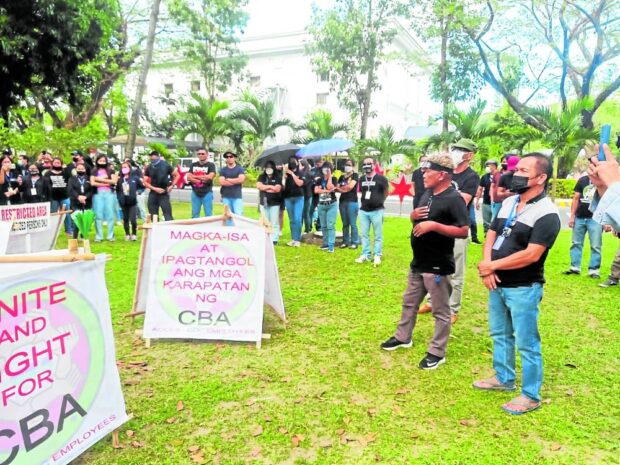
LUNCH BREAK PICKET Workers of the state-owned Clark Development Corp. stage a protest during their lunch break on Jan. 20 to fight for the release of allowances, benefits and incentives they obtained through their collective bargaining agreement with the company but has been withheld as part of a new compensation system based on a law signed by former President Duterte. CONTRIBUTED PHOTO. (file)
CLARK FREEPORT—Labor Secretary Bienvenido Laguesma denied the motion of the 500 rank-and-file employees of state-owned Clark Development Corp. (CDC) to release their allowances, benefits and incentives (ABI), citing a Supreme Court decision that found these benefits obtained through collective bargaining agreements (CBA) as “unlawful.”
The likely loss of the ABI by members of the Association of Concerned CDC Employees (Acces) surfaced as Laguesma, in a resolution on April 12, cited the high court’s March 30, 2022, ruling when he resolved the petition of the workers who were seeking the release of their benefits now held on escrow.
The Supreme Court, in its 2022 ruling, declared the CDC has “valid reason not to implement the increases in salaries and benefits as provided in the renegotiated CBA” with the Association of CDC Supervisory Personnel Union in 2012. The high tribunal was acting on the petition for review filed by the CDC on the 2013 decision of the Court of Appeals that favored the salary hike and ABI of CDC supervisors, which they won in their 2012 CBA with the company.
The Supreme Court ruled that the “law fixed the terms and conditions of government employment and any contract that violates the law is void and cannot be a source of rights and obligations.”
Binding to Dole
The high court referred to Executive Order No. 7, issued in 2010, that ordered the rationalization of the compensation and position classification system and imposed a moratorium on increases in salaries and benefits in government-owned and -controlled corporations (GOCCs) unless authorized by the President.
In 2011, Republic Act No. 10149 authorized the President to fix the GOCCs’ compensation, removed the authority of GOCCs to determine their own compensation system and directed the Governance Commission on GOCCs (GCG) to develop new salary and position schemes.
In June 2022, the GCG ordered the CDC to implement the new wage and position systems it had developed, which effectively canceled the CBA and the ABI enjoyed by the workers and caused an uproar among the employees.
Laguesma, who assumed jurisdiction over the dispute on Jan. 16 this year to avert a strike, said in his April 12 resolution that the arguments raised by the workers’ unions before his office had been resolved by the Supreme Court in favor of the state-owned company.
“The ruling binds this office, it cannot have any other conclusion but that the collective bargaining rights of the parties while originally governed purely by the Labor Code must now be subject to the provisions and limitations imposed by Republic Act No. 10149 and related issuances including Executive Order No. 150,” added Laguesma.
EO 150 standardized salaries in GOCCs according to the compensation and position systems approved by the GCG.
Laguesma also stopped Acces from doing “concerted actions” such as marches and assemblies. Laguesma reiterated his order for the CDC to put in escrow the amounts intended for the workers’ benefits since the matter has already been elevated before the Office of the President for a final decision on whether or not the union workers are entitled to their benefits.
In a statement, the CDC said Laguesma’s resolution “recognized that CDC applied the correct remedy on the discontinuance of CBA benefits by filing a petition for their recognition with the Office of the President.”
Acces president Edsel Manalili, when sought for comment, said “the decisions are saddening.”
The escrow, according to Laguesma, “protects all parties,” adding that “if the condition of recognition happens, the amounts in escrow will be promptly released to the employees. If the condition does not happen, the amounts will revert to the company’s coffers.”